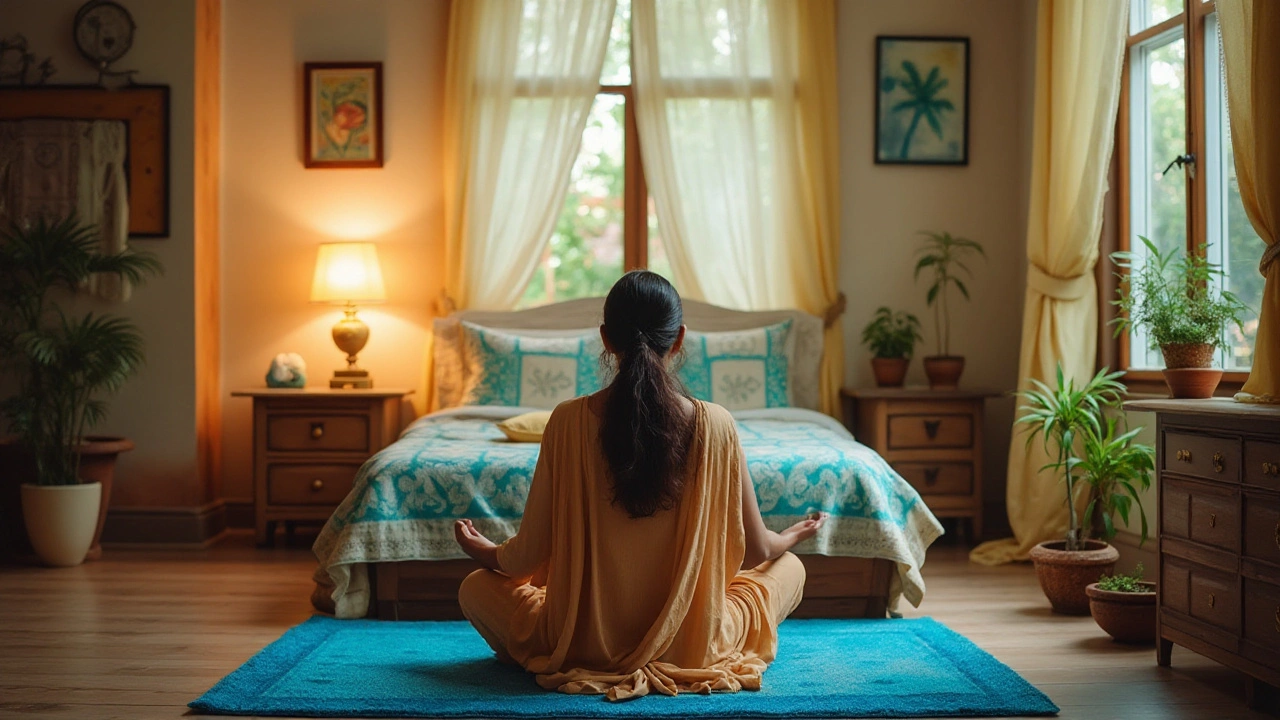Decluttering a room might feel like you're climbing a mountain of stuff, especially when you aren't sure where to begin or how long it will take. It's easy to feel buried under years of accumulated belongings or anxious about sacrificing your weekend to cleaning duties. However, with the right approach, even the most cluttered room can be transformed into an organized oasis.
This article delves into practical methods that simplify the process of decluttering, enabling you to reclaim your space efficiently. From smart time management techniques to creative organizational tips, we will guide you in understanding not just how to clear your space, but also how to maintain it effortlessly. Say goodbye to unnecessary stress and hello to a serene, clutter-free environment in no time!
- Understanding Clutter and Its Impact
- Time Management Techniques for Decluttering
- Effective Decluttering Strategies
- Maintaining a Clutter-Free Space
Understanding Clutter and Its Impact
Clutter isn't just a random mess; it's a complex web of emotional, mental, and physical implications that can deeply affect your daily life. The physical manifestation of clutter is easy to see—piles of clothes, stacks of papers, or a jumble of shoes at the door. But lurking beneath the surface is its true impact on well-being. Studies show that clutter can contribute to stress and anxiety, making individuals feel overwhelmed and even hopeless. Imagine walking into a room where every surface is covered with items; such an environment can instantly make a person feel trapped. This is because humans generally crave order and predictability, and clutter disrupts our innate desire for harmony and security.
The psychological burden of clutter can also stretch into social aspects. If a room is consistently messy, hosting guests might become an embarrassment, leading to social isolation. Relationships can suffer when shared spaces are disorganized, creating tension over cleaning duties and responsibilities. For example, a cluttered kitchen might discourage family meals or gatherings, pushing members to seek space elsewhere. Moreover, clutter can negatively impact productivity by making it harder to concentrate on tasks. Studies suggest that clutter overloads the brain, reducing attention span and increasing mental fatigue, which is why maintaining a tidy space is so crucial.
Health Impacts and Practical Concerns
Beyond mental health, clutter can pose real physical health risks. Dust, mold, and allergens accumulate more readily in crowded spaces, potentially exacerbating allergies and asthma. Objects strewn about can become tripping hazards, especially for children and the elderly. A cluttered environment may also obscure important items, such as medication or emergency supplies, which becomes a significant safety threat. Additionally, when clutter escalates into hoarding, it can interfere with everyday life and invites numerous health risks. A study by researchers at Yale University discovered that hoarding is often linked with high levels of distress and interference with normal daily activities.
"Clutter is not just the stuff on your floor—it's anything that stands between you and the life you want to be living," says Peter Walsh, renowned organization expert.
This sentiment reinforces the idea that decluttering is more than tidying up; it's about paving the way to a more fulfilling and focused life. The realization that clutter's chaos translates into intangible disorders highlights the importance of tackling it. Navigating these are critical steps toward achieving greater peace and productivity.
Addressing clutter involves more than just stashing things into storage solutions. It's about making thoughtful decisions about what to keep and what to let go. The process invites a therapeutic introspection, allowing individuals to examine attachments to their possessions and reflect on personal priorities. Understanding these elements offers a comprehensive perspective on the practical necessity and emotional journey of decluttering, setting the stage for a holistic transformation of your living space.

Time Management Techniques for Decluttering
When it comes to decluttering a room, time is often the greatest obstacle many of us face. It is not uncommon to find that the busyness of daily life leaves precious little time or energy to tackle the mess that slowly creeps up in our living spaces. However, by adopting certain time management strategies, you can make significant progress in organizing your room efficiently without dedicating your entire day to the process. One effective technique is the segmentation of tasks into smaller, more manageable chunks. Instead of attempting to tackle the entirety of a room in one go, focus on one area or category at a time. This not only makes the task feel less overwhelming but also improves your focus and productivity.
Another strategy is to set a timer. Allot yourself a specific amount of time, such as twenty minutes, and work diligently during that period without interruptions. Known as the Pomodoro Technique, this method can significantly enhance your ability to stay on task and accomplish more within shorter bursts of time. Plus, it allows you to incorporate short breaks to recharge, preventing burnout and maintaining your decluttering momentum. Have you ever wondered how often people use this method? Indeed, according to a survey by the Home Organizers Association, approximately 73% of people who practiced time-boxed decluttering found it more efficient.
It's also wise to prioritize your tasks. Start by identifying spaces that demand immediate attention, perhaps those that impact your daily routine the most. For instance, clearing off countertops in the kitchen or organizing your desk at work can alleviate stress significantly as they are primary work surfaces. Listing tasks in their order of importance can help maintain clarity and focus during the decluttering process. Moreover, make sure you are equipped with necessary supplies before starting, such as trash bags, boxes, and cleaning solutions, ensuring that you won't have to pause midway to gather essentials.
Incorporating a music playlist and making decluttering a fun, lively activity can make a world of difference too. Upbeat songs not only enhance your mood but can also make the time fly by, transforming what was once a mundane chore into a workout session with rewarding results. Research indicates that listening to music can increase productivity by as much as 15%, meaning you might clear more clutter while simply enjoying yourself. Remember, not every method works for everyone. It’s crucial to assess what resonates best with your personality and lifestyle to unlock the most efficient decluttering routine that you can sustain in the long term.

Effective Decluttering Strategies
Embarking on the journey to declutter can feel overwhelming, yet with a few proven strategies, the task becomes more manageable. A common pitfall is attempting to tackle the whole room at once, which is why breaking it down into smaller, achievable tasks is crucial. Start by focusing on one specific area, like a closet or a single set of shelves. This method not only reduces the intimidation factor, but also provides a clear path toward completing the project. Setting a timer can help; devote a set amount of time each day or week to work in one area, and soon, you'll see significant progress without feeling exhausted. Many find that sorting items into four categories—keep, donate, sell, and discard—is an efficient way to assess belongings.
Additionally, using the 'one-in, one-out' rule, where a new item only comes in if something else goes out, can be a game-changer. Not only does this keep clutter at bay, it also encourages mindful purchasing decisions. Clearing a workspace, for instance, by reducing the presence of every item, helps set a baseline for what truly deserves room presence. Consider asking yourself if each item brings joy or utility. This doesn't mean that every item maintained must spark happiness—though it's a concept popularized by Marie Kondo—but evaluating the utility can equally validate an item’s presence. Many have embraced strategies like digitalizing mementos or paperwork, which not only saves physical space but also secures important memories from physical degradation.
Decluttering isn't just about creating space, it's a process of letting go. Make it a habit rather than a chore by scheduling regular intervals into your routine. For instance, tidying up for 15 minutes at the end of the day can prevent larger messes from gaining a foothold. The 'touch it once' rule—a popular technique—urges you to take immediate action on an item rather than shift it from one place to another. This approach can often prevent procrastination and reduce clutter buildup over time.
If you find decision-making challenging, enlist the help of a friend or family member to provide objective perspectives. This person can be a 'clutter coach,' long advocated by organizers for keeping you on track. For those who don't know where to start, a professional organizer may also provide a guiding hand for strategizing the most effective approach. NerdWallet notes that households spend an average of 20 minutes per day searching for misplaced items, which translates to over 120 hours annually. Streamlining your room organization could save you the equivalent of five full days, time better spent on things you enjoy.
Sometimes, breaking the emotional attachment to items can be the hardest step. Implementing mindfulness techniques, such as setting intentions for each space, can reframe the process positively. Keeping an inventory log, a popular activity among minimalist communities, lets you track frequency of use and decides if something still earns its keep. Think of decluttering not as an act of throwing away, but as a form of liberation, both physically and mentally.
Effective decluttering is meticulous, yet incredibly rewarding. When done correctly, it unlocks a life filled with clarity and intentional living. The shift towards a simpler, clutter-free lifestyle often brings surprising benefits, from reduced stress and improved focus to a greater appreciation for the items that you choose to surround yourself with. As the world continues to champion sustainable living, adopting these decluttering strategies not only crafts a beautiful environment but also supports an eco-friendly mindset.

Maintaining a Clutter-Free Space
Once you've put in the effort to declutter your room, keeping it organized can be a bit like tending a garden—it requires routine care and attention but the rewards are undeniable. A clutter-free space promotes a calmer mind, increases productivity, and contributes to an inviting home environment. The key to sustaining this state is establishing daily habits and practical strategies that become part of your lifestyle.
A great starting point is the 'one-in, one-out' rule. This approach ensures that for every new item you bring into your room, an old one must find its way out. This method not only prevents your space from becoming overcrowded but also encourages intentional purchasing behavior. It's astonishing how often impulse buys lead to clutter—this strategy helps keep your space streamlined and purposeful. Also, remember to categorize your items. Assign designated storage spots for each category—be it books, clothes, or tech gadgets—making it easy to locate things and return them after use.
Another effective practice is establishing a routine for decluttering. Much like how we naturally fall into patterns for chores such as doing laundry weekly, we should also have set times to evaluate and declutter our spaces regularly. Implementing a 10-minute tidy-up each evening can significantly reduce clutter accumulation. Simply straightening pillows, placing items back in their spots, and clearing work surfaces can make your mornings less stressful and your evenings more relaxing.
"Have nothing in your house that you do not know to be useful, or believe to be beautiful." This timeless advice from designer William Morris resonates deeply with the concept of maintaining a minimalistic yet meaningful environment.
Technology can also lend a hand in keeping disorder at bay. There are numerous apps designed to assist with organization—from reminder apps that prompt you to declutter specific areas periodically to ones that help create digital inventories of your belongings. By integrating these into your daily routines, you ensure that organization remains convenient and engaging. An organized space greatly reflects an efficient lifestyle, and these digital tools can make the task even simpler.
Finally, consider embracing a minimalist mindset. Embrace the idea that less can be more. By focusing on quality over quantity, you can keep your space not just organized, but also filled with items that bring joy and serve a purpose. This shift in mindset, coupled with consistent decluttering and tidy habits, will pave the way for a truly clutter-free space, where relaxation and productivity come naturally.
